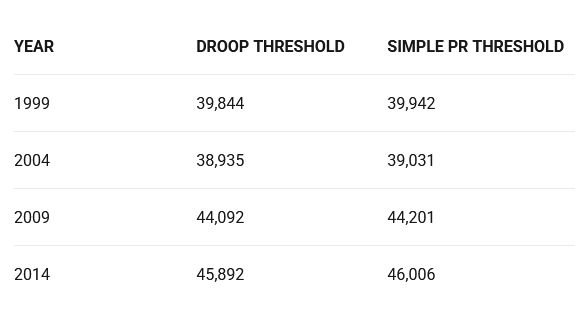Debunking the “Don’t Vote For A Small Party!” Myth

Written by: Mpiyakhe Dhlamini
One of the most enduring myths is that voting for a small party splits the opposition vote and leads to a lower vote overall. These fear-mongering claims are false. In fact, there’s a slight advantage to giving your vote to a smaller party. Let’s review the formula described in the Electoral Act and then look at examples from the most recent election – 2014 – to test these claims.
South Africa’s general elections are conducted under a system of proportional representation (PR). This means that the share of seats a party wins in Parliament is roughly equal to the share of the total vote that party wins. This percentage is calculated as a fraction of the valid vote. (Spoiled votes have no effect). This means that smaller parties are theoretically able to win seats in Parliament, unlike in a constituency system where the two largest parties are favoured.
The framers of South Africa’s Constitution, both liberal and nationalist, decided that a PR system was the best option for SA in order to ensure a system where even the smallest minority of voters could have a voice in government. The problem with such a system might seem a minor one but can have a significant effect: How to translate fractional proportions into an integer number of seats. One of the most widely-used methods is the droop quota. The droop quota is named after Henry Droop, an English lawyer and mathematician. South Africa uses this method of calculation.
The formula gives you the number of valid votes a party requires to win a seat. You gets this number by dividing the total number of valid votes by the number of seats plus 1, and add 1 to this quotient. You then take the integer part of the resulting number to get the threshold number of votes for a seat. Doing this always produces a lower threshold, then using simple proportions because you add 1 to the number of seats. The following table shows the droop threshold as well as the simple PR threshold for each election since 1999:
YEARDROOP THRESHOLDSIMPLE PR THRESHOLD199939,84439,942200438,93539,031200944,09244,201201445,89246,006
Since the droop threshold is always lower, it means the chances of a smaller party gaining at least one seat is increased, albeit marginally.
The next question is that of the residual votes. These are those votes that were over and above the droop integer threshold, i.e. the fractional part of the droop number.
The Electoral Act says in the case of the 200 National List seats, the top five fractions will each get a seat if five or more are remaining. If there are more than five remaining seats, the rest will be distributed using the highest average number of seats each party has. For the Regional List seats, all residuals are distributed using the droop fractions.
This system means that smaller parties tend to get more seats from the residuals, since a national small party that doesn’t meet the droop threshold is much more likely to have a high droop fraction of the vote. As an example, in 2014 the APC got 30,676 votes, well below the 45,892 droop threshold and 0.17% of the vote, but still got 1 seat. Agang got 52,350 votes and 2 seats, even though they just barely got over the droop threshold for 1 seat and only had 0.28% of the vote.
What remains now is to show that smaller parties tend to get more of the seats that result from the votes given to parties that don’t make it into Parliament. The following table will help:
The table shows all the parties that received a seat due to the so-called “wasted votes” or residuals. Interestingly, all the parties that oppose expropriation without compensation (EWC) received a seat due to this phenomenon. The only ones who did not are the EFF, NFP and the UDM: All parties that support EWC.
Now imagine if all the wasted votes had gone to the biggest opposition party and opponent of EWC – the DA. It would have meant an extra 0.96% or at most 93 seats instead of the 89 they received. This would have meant exactly the same number of seats available to oppose EWC. Keeping in mind that many of the “wasted” votes went to parties like AZAPO who have voters that would likely have never voted DA anyway, so the actual extra percentage would have been much less.
In general, it is safe to say that due to the peculiarities of how votes are translated into seats, voting for a smaller party is hardly a waste. If anything, voting for the smallest opposition party that agrees with your principles and has a reasonable chance of gaining at least one seat, seems to be the optimal strategy.
Mpiyakhe Dhlamini is a libertarian, writer, programmer and an associate of the Free Market Foundation



